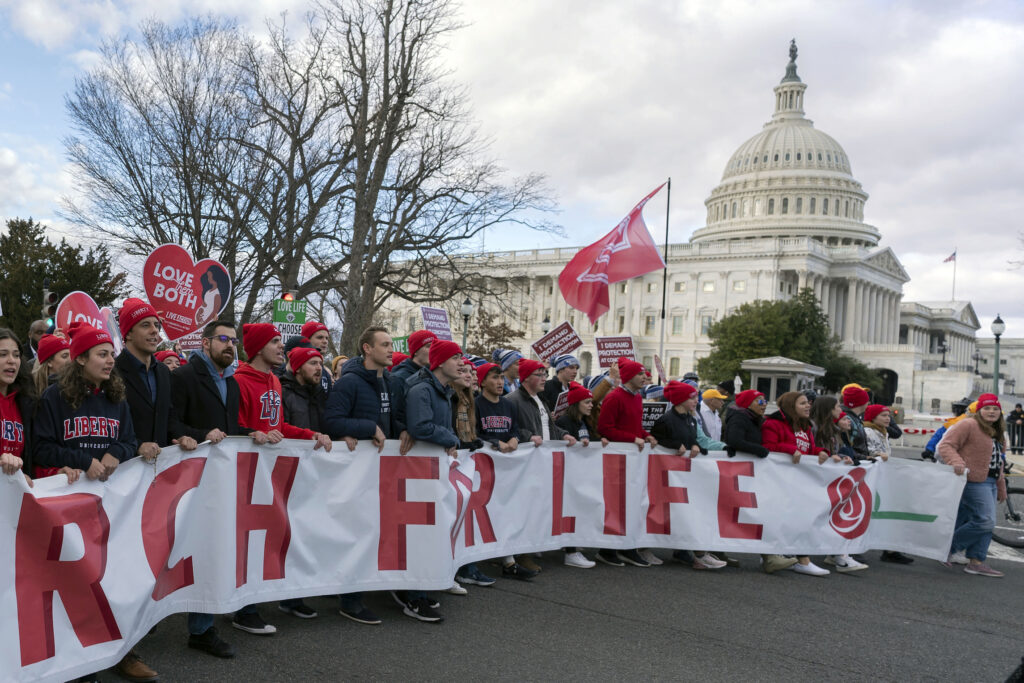

As the March for Life gathers in Washington, D.C., for the second time since Roe v. Wade was reversed, Republicans appear poised to nominate a presidential candidate reluctant to impose new federal limits on abortion favored by leading anti-abortion groups.
Former President Donald Trump beat Gov. Ron DeSantis (R-FL) by nearly 30 points in the Iowa caucuses earlier this week after repeatedly criticizing the Florida governor for signing a law banning abortions after six weeks in the Sunshine State.
ELECTION 2024: FOLLOW LATEST COVERAGE
Evangelical Christians voted for Trump by an even bigger margin, according to entrance polls. This crucial socially conservative voting bloc gave Trump 53% of their votes to DeSantis’s 27% despite the latter repeatedly trying to make abortion a major issue in the Iowa race.
Only 11% listed abortion as their top voting issue, though 61% of caucusgoers said they supported federal legislation banning most or all abortions nationwide. Trump won this group by 30 points, 55% to DeSantis’s 25%. Trump beat former U.N. Ambassador Nikki Haley by 9 points among the minority of Iowa Republicans who said they would oppose such a law.
The race now moves to New Hampshire, which is more secular, more skeptical of abortion restrictions, and less evangelical than Iowa. The top two candidates in the public polling are Trump and Haley, who have both been less eager than DeSantis to engage the federal government on this issue.
“So when we’re looking at this, there are some states that are going more on the pro-life side. I welcome that. There are some states that are going more on the pro-choice side — I wish that wasn’t the case, but the people decided,” Haley said. “We don’t need to divide America over this issue anymore.”
Haley has stressed the need for abortion policy to have broad public support. “As much as I’m pro-life, I don’t judge anyone for being pro-choice, and I don’t want them to judge me for being pro-life,” she said last year. “Let’s find consensus. … We don’t need to divide America over this issue anymore.”
Trump says that Republicans must “negotiate” an appropriate abortion policy, prudently using the power he helped give abortion foes by appointing justices who voted to overturn Roe.
“And I have to tell you, the pro-lifers now have tremendous power to negotiate, which they didn’t have before the ruling,” Trump said of Dobbs v. Jackson Women’s Health Organization in South Carolina last year. “They have to understand how to talk about it. Because Republicans, you’re going to have to learn how to talk about it.”
“Nobody has done more on that record than me,” he added. “I happen to be for the exceptions, like Ronald Reagan, with the life of the mother, rape, incest, I just have to be there,” Trump said at the recent Fox News town hall that ran opposite the Haley-DeSantis debate. He added that opponents of legal abortion “have to win elections” in order to write new laws.
“Otherwise, you are going to be back where you were, and you can’t let that ever happen again,” Trump added.
Trump said he was “proud” of his role in overturning Roe. Haley has said she is “unapologetically pro-life.” Both candidates have suggested they would sign anti-abortion legislation that reached their desks as president, though Haley in particular has expressed skepticism that a ban after 15 weeks could clear the Senate due to the 60-vote threshold to break a filibuster.
But anti-abortion activists are wary of Trump, who in 1999 described himself as “very pro-choice” and will be ineligible to seek a third term in 2028, backtracking on abortion. And Haley’s abortion messaging hasn’t been radically different from the front-runner’s.
When Roe was narrowly upheld by the Supreme Court in 1992’s Planned Parenthood v. Casey decision, these groups were disappointed that justices appointed by two Republican presidents had let them down. But Casey allowed them to make policy on issues like late-term abortion, parental involvement laws, and restrictions on taxpayer funding, all areas where the anti-abortion position was popular.
If the 1990s and 2000s saw slow but steady progress moving public opinion on abortion — a May 2009 Gallup poll found 51% identifying as anti-abortion compared to 42% who described themselves as abortion-rights — the anti-abortion movement has experienced setbacks since Roe was reversed in 2022.
CLICK HERE TO READ MORE FROM THE WASHINGTON EXAMINER
Anti-abortion groups hope to turn things around, beginning as soon as this year’s elections.
Roe’s 51st anniversary is this coming Monday.




